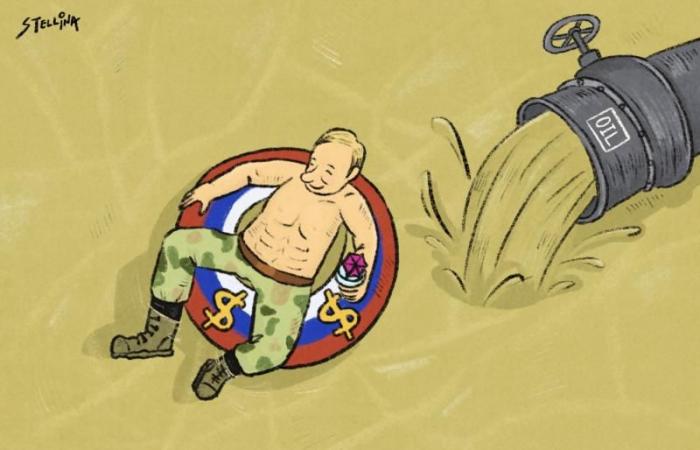Already in February 2024, we wrote about a “ghost fleet” of often dilapidated and uninsured ships carrying Russian oil through the Danish straits banned by the EU. This kind of occult displacement still occurs today. “Every day this environmental time bomb crosses Danish waters”, report Mads Lorenzen et Kresten Andersen In Finance.
More recently, Follow the Moneyan independent investigative journalism platform based in Amsterdam, has published two installments of their North Sea investigation, North Sea Investigations. These two articles revolve around the important subject of “dilapidated oil tankers, potential environmental disasters that threaten Europe”.
Jesse Pinster et Dimitri Tokmetzisin collaboration with Global Fishing Watch and the Kyiv School of Economics Institute, provide us with precise figures on the number of vessels involved, the routes they take and whether or not they are insured. Using this data, it is possible to assess the risk they pose to Europeans and their waters.
“Since January 2023, Russian tankers have crossed the Baltic Sea, skirted North-West Europe and the coasts of United Kingdomof the France a you Portugal almost 1300 times. Most of these ships sail towards the Mediterranean, to go to Asia. On average, two to three such trips are made every day. Some ships only use this route once, others many more. In total, FTM has identified 410 different tankers carrying Russian oil on this route”, they write.
These ships have little or no insurance, which would force Europe to foot the bill in the event of an accident in its waters. In addition, the majority of these ships are more than 20 years old: the risk of disaster is therefore significant. As the journalists explain, “aAfter 22 years, an oil tanker normally ends up in the scrapyard.”
Are you interested in this article?
It is freely accessible thanks to the support of our community. Publish and translate our articles at a cost. To continue to inform you independently, we need your support.
I subscribe or I make a donation
Russia is moving forward in disguise, through tax havens or shell companies, to circumvent European Union sanctions on its oil. In June 2024, “27 ships, including 18 oil tankers, have been placed on the European sanctions list”. This means that European ports and companies are prohibited from supplying “crew, equipment or financial services such as insurance” to these ships.
As explained by Pinster and Tokmetzis, these new sanctions only partially work: “According to the platform's oceanography and energy researchers Vortexawhich tracks the trajectories of goods, 30% of sanctioned ships have ceased their activity transporting Russian oil. However, on six occasions one of these tankers was able to navigate the North Sea unhindered. The vessel Kavya entered Dutch, Danish and British territorial waters on August 27, according to data from Global Fishing Watch”. It should also be noted that 27 ships sanctioned is very few, compared to the rest of the fleet, estimated at a total of 600 ships. The authors conclude that the risk of disaster will remain high until European authorities find a more effective solution to combat these tankers.
The best of European journalism in your inbox every Thursday
In Jesse Pinster's second article about the Russian ghost fleet for Follow the Moneyhe spoke to Jan Stockbruegger, a maritime security expert based in Copenhagen. For Stockbruegger, the EU and the United States have created a “monster” by capping the price of Russian oil. Indeed, according to him, this cap, introduced in 2022, is only an ineffective half-solution, the only aim of which is to punish the Kremlin without disrupting the world economy: “Russian oil is a classic 'you can't live with it, but you can't live without it' story. Impossible to live with because it finances the war against Ukraine. But impossible to live without it because it is vital for the global economy. This is the dilemma.”
As the security expert explains, the effectiveness of price caps is overestimated. Certainly, demand for Russian oil has diminished. However, 90% of this oil, thanks to help from China and India, is still selling above the cap. “Russia is losing money, but much less than our initial estimates. The kyiv School of Economics (KSE) estimates that Russia's monthly losses have fallen to $2.5 billion, down from $8.4 billion in January 2023. Russia's war economy is doing well, in part thanks to oil exports which finance its war againstUkraine.”
To conclude, Stockbruegger believes that personal political and economic interests are an obstacle to truly effective sanctions: “If Russian oil were withdrawn from the market… The energy crisis of two years ago would pale in comparison to what would happen then. We need Russian oil. This is perhaps why so few ships are sanctioned.”
“In the shit”
“For too long we have neglected our aquatic environment in favor of our agricultural policies, and now we are really in trouble”. This graphic quote comes to us from Søren Egge Rasmussen, environment spokesperson for the eco-socialist Unity List party in Denmark. He was responding to an article showing oxygen levels lower than ever in Danish waters. This report from the National Center for Environment and Energy at Aarhus University has sparked opposition members, who are calling for greater efforts to combat the impact “desperate and severe” of intensive agriculture and its nitrogen emissions on water quality, expose Marie Møller Munksgaard and Dorte Ipsen Boddum for Everything. In another article for the same newspaper, Marie Møller Munksgaard puts into context a situation that the main author of the report describes as “environmental disaster.”
As the latest report from the European Environment Agency on water quality suggests, the situation at European level is not more encouraging. “Only 37% of Europe's surface water reaches 'good' or 'high' ecological status, according to the Water Framework Directive, and only 29% achieves 'good' chemical status between 2015 and 2021”, summarizes Leonie Carter in Politico Europe. “Some countries have managed to avoid a deterioration in the state of EU waters, but 'no overall improvement' has been detected since the last observation cycle. This slow progress is partly due to 'a lack of funds and a lack of integration of environmental objectives into sectoral policies'.”






